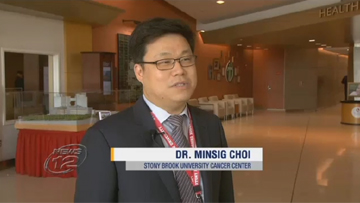March Is National Colorectal Cancer Awareness Month! Colorectal cancer screening saves lives. If everyone 50 years old or older were screened regularly, as many as 60% of deaths from this cancer could be avoided.
Colorectal cancer — also known as colon cancer — is the second leading cause of cancer-related deaths in the United States. It affects both men and women. Every year, more than 140,000 Americans are diagnosed with colorectal cancer, and more than 50,000 people die from it.
Awareness of colorectal cancer and its common signs is well worth it, because when detected early this cancer can be treated effectively.
Here, Paula I. Denoya, MD, a member of the faculty of our Colon and Rectal Surgery Division, answers frequently asked questions about colorectal cancer, with special attention to its common warning signs, detection, and treatment.
Q: What is colorectal cancer?
A: Colorectal cancer arises from the lining of the colon or rectum, usually from cells that secrete mucus. In many cases, it starts out as a polyp, which is a premalignant, benign lesion or an overgrowth in the lining of the colon. If left alone, a polyp can grow into cancer. However, with screening, polyps can be detected and removed, thus preventing cancer altogether.
Q: What are the signs and symptoms?
A: Colorectal cancer is often symptomless, which is why screening is so important. Some people do experience telltale signs, however. Ten warning signs of colorectal cancer are:
- Blood in stool
- Persistent diarrhea
- Persistent vomiting
- Cramping abdominal pain
- Persistent bloating
- Unexplained weight loss
- Decreased stool size
- Unexplained fatigue
- Change in bowel habits
- Incomplete emptying of bowel
Anyone experiencing these symptoms should speak with their primary care physician.
Q: Who is at risk?
A: According to the American Cancer Society (ACS), colorectal cancer is the third most common cancer in men and women. Gender does not seem to be a factor, but age is, and risk increases after age 50.
People considered to be at higher risk include those with a family history of polyps, colon cancer, or uterine cancer; individuals with inflammatory bowel disease; anyone with a personal history of polyps; and persons with inherited syndromes such as familial adenomatous polyposis and hereditary nonpolyposis colorectal cancer.
The ACS recommends that people undergo screenings starting at age 50, with a follow-up every 10 years if no polyps are detected. Individuals at high risk should start screenings earlier and have more frequent follow-ups.
Colorectal cancer can be prevented, and it is extremely curable if caught early.
Q: How is colorectal cancer detected?
A: Colonoscopy is considered the gold standard because it is the only test that can identify and treat polyps in the entire colon. Further, if a polyp is detected during screening, it often can be removed and biopsied at that time, eliminating the need for additional procedures. (See our 2012 blog post, "New Report Affirms Lifesaving Role of Colonoscopy: Death Risk Is Cut in Half.")
While people often dread undergoing a colonoscopy, it is important to know that recent changes make it a gentler experience. For example, Stony Brook uses many different kinds of bowel preparations — some are even in pill form. The patient's physician will determine which preparation the patient will best tolerate.
In the past, patients remained awake for the procedure, but now, with innovations in anesthesia, patients undergo a short, fast-working, and deep sedation that has minimal side effects including no memory of the procedure.
Stony Brook offers additional screening methods, including flexible sigmoidoscopy, barium enemas, fecal occult blood testing, and CT colonography, also known as virtual colonoscopy.
Virtual colonoscopy was invented at Stony Brook in the 1980s. While less invasive than a traditional colonoscopy because it uses a CT scan to look at the lining of the colon, it still requires bowel preparation. It is generally used with patients who may have an existing colon blockage or for whom a colonoscopy carries risks, for example, from anesthesia. Unlike a colonoscopy, in which a polyp can be removed during the screening procedure, during a virtual colonoscopy, if a polyp is detected, the patient will need an additional procedure to treat and biopsy it.
Q: If cancer is detected, how is it treated?
A: Colorectal cancers respond well to treatment, and often treatment is relatively uncomplicated. About 30% of cases can be treated with surgery alone. Cancers in later stages respond well to chemotherapy and radiation, and overall, the five-year survival rate approaches 65%.
Colorectal cancer is treatable — know your options.

Q: What distinguishes Stony Brook's approach?
A: Stony Brook Medicine offers the latest protocols and treatments for colorectal cancers — delivered by a multidisciplinary team — including the new transanal endoscopic microsurgery, a less invasive procedure than the traditional approach for reaching lesions high up in the rectum.
We are renowned leaders in the use of minimally invasive laparoscopic surgery for treating colorectal cancer, which offers patients considerable benefits.
Using the da Vinci® Si robotic surgical system, our surgeons offer patients another option beyond traditional open surgery and laparoscopic procedures. The major advantage of this minimally invasive technique is that it provides surgeons with enhanced visibility and mobility.
This improves accuracy, provides cleaner "margins" (which means that no cancer cells are seen at the outer edge of the tissue that was removed) and helps ensure that all the lymph nodes (difficult to see and reach by conventional methods) can be removed during the procedure.
Benefits to the patient having robotic surgery include less bleeding, less scarring, less pain, and a lowered risk of infection.
In addition, we are working to advance the practice of medicine through clinical trials and testing. We currently are participating in a multi-institution trial run by the American College of Surgeons Oncology Group to pioneer a minimally invasive laparoscopic treatment for rectal cancers.
For standard treatment approaches, we work closely with oncologists, radiologists, pathologists, and other specialists on the colorectal cancer multidisciplinary team at Stony Brook Cancer Center to provide comprehensive cancer care to our patients.
If you are over age 50 and have not yet had a colonoscopy, schedule one soon by calling Stony Brook's Direct Access Screening Colonoscopy Programat 631-444-COLON (2656) . You can request an appointment online, too.
| Americans of African descent are approximately 40% more likely to die from colon cancer, compared to individuals who are of Caucasian descent. Because of this health disparity, researchers from Stony Brook University have created a partnership with SUNY Downstate and Cold Spring Harbor Laboratory to launch a program to assess gastrointestinal cancer biology in patients. Watch video (4:55 min) that explains. |



